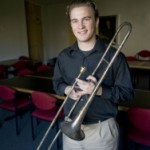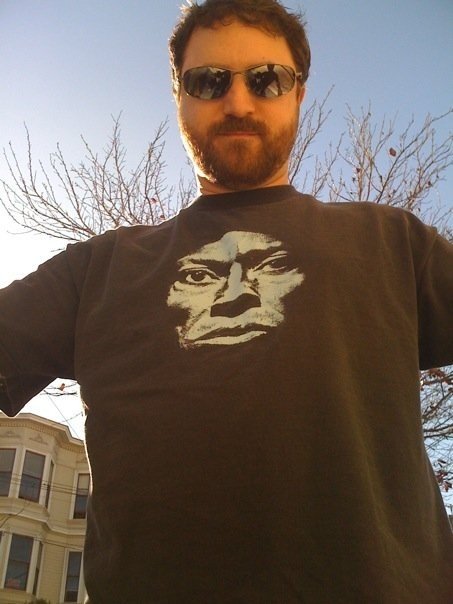 My month of guest blog posts continues today with some very practical advice from Alex W. Rodriguez. Alex is a writer, trombonist and Masters Degree candidate in Jazz History and Research at Rutgers, The State University of New Jersey. His MA thesis will analyze modern representations of one of the first great jazz trombonists, Jack Teagarden. He was recently hired as a contributor for jazz.com’s Encyclopedia of Jazz Musicians, and will be writing entries on the great trombonists of the jazz tradition.
My month of guest blog posts continues today with some very practical advice from Alex W. Rodriguez. Alex is a writer, trombonist and Masters Degree candidate in Jazz History and Research at Rutgers, The State University of New Jersey. His MA thesis will analyze modern representations of one of the first great jazz trombonists, Jack Teagarden. He was recently hired as a contributor for jazz.com’s Encyclopedia of Jazz Musicians, and will be writing entries on the great trombonists of the jazz tradition.
Alex writes an insightful and often witty blog, called Lubricity, where he discusses the “definition-resistant musical tradition we call jazz through my perspective as a young trombonist and aspiring jazz historian.” The post that first caught my eye and made me realize that Alex and I had much to discuss was “Beyond the Starving Artist”.
Alex’s guest post gives some real-world, concrete advice to young, aspiring musicians. And he knows of what he speaks, being one himself.
Seven Steps to Heaven
This time two years ago, I had just received my BA in Jazz Trombone Performance from Amherst College. My senior recital was over, I had received my diploma and was off on my own — and I had no idea what the heck to do next.
I had moved to Oakland, CA with my girlfriend, and figured that somehow I’d figure out a way to make a living with my horn and my bachelor’s degree. I knew practically nobody, and remember feeling confused and overwhelmed. I was a finalist for a salaried job in the education department of a large jazz nonprofit organization, but was turned down for a more experienced candidate.
I wasn’t playing that much, hadn’t met many other musicians, and was too intimidated to go to jam sessions. I browsed gig offers and teaching jobs on craigslist, and introduced myself to a few local band directors. I volunteered at a local music school, and struggled to make ends meet. For awhile, I was barely bringing in any money, and had to rely on Marina’s income and a gift from my family to float us month to month. I felt ashamed that I couldn’t pull my own weight in the workforce.
Pressure to bring in money led me to teaching, which I had always thought about anyway. I managed a piecemeal schedule of coaching, an after school band, and substitute teaching for the Oakland Unified School District’s band directors. My heart wasn’t fully in it, though, and the stressful nature of the jobs eventually led me to stop playing music for the last few months of my time there, when I spent most of my time tutoring for an SAT prep company and subbing for bilingual elementary school teachers. It wasn’t until I decided to return to school for my MA that I was able to get my musical spirit back up and running again.
Looking back on the experience, I realize now where I made most of my mistakes. With Jason off getting hitched, these are my seven suggestions to those who are fresh on the scene:
1) Set goals. Before you get started, ask yourself some questions: Where would I like to be musically in a year? Will I have a demo? A record? A studio gig? Be on tour? What kinds of musicians do I want to be surrounded by? What sort of music would I like to be playing? Do I want to be writing my own music? Producing for others? Set shorter-term goals as stepping stones to those larger questions. Once you have a clear idea of what your goals are, make a schedule for yourself where you take steps towards achieving them every day. Figure out when you do your best work — when do you practice best? When do you compose best? Transcribe? Make phone calls? Send e-mails? Figure out what works for you and stick to it.
2) Figure out how you’re going to make money. There are numerous ways to use your musical skill to earn money: gigs, teaching, coaching, arts non-profits, the list goes on. There are also numerous ways to make money without using your musical skills — don’t be ashamed if you need a side gig to help pay the bills. Also, if you have any other skills or talents, don’t feel like you have to push them aside for the sake of your music.
3) Establish yourself online. Start a website. Getting involved in the online community of musicians and music fans is really important. Even if it’s a free wordpress blog, it’s important to have something more than MySpace. As your career develops, you may decide to expand your presence online to attract more fans, but it’s an important thing to have going from the beginning. Also, sign up for Twitter and friend people on Facebook once you’ve played with them.
4) Establish yourself locally. Whatever it is that you want to do, be clear about it in your interactions with other people. My biggest mistake during my time in Oakland was my unwillingness to make up my mind about what I wanted to do. It doesn’t have to be permanent, but at least in the short-to-medium-term, be confident in whatever you’re doing. If you want to hang with the baddest jazz cats, go to jam sessions. Find ways to introduce yourself to the people who are established in the scene and look for opportunities to play with them.
4a) STAY AWAY FROM CRAIGSLIST! The pro-am musician circuit is an abominable death trap for an aspiring musician fresh on the scene. The gigs don’t pay, and they won’t lead to gigs that do pay. Develop relationships with musicians who are successfully going about their business — if anyone has to advertise on craigslist, it means they aren’t plugged into the network of successful musicians.
5) Have a nice resume (or two). Some people will be evaluating you based on more than your playing chops. For teaching gigs, nonprofit work, and other opportunities, you may have to present yourself in the “traditional” job-hunting manner. Having a boring or irrelevant resume will make it harder for you to get hired. Use a resume template (Google Docs has some good ones) and make sure it looks nice. Export it as a .pdf instead of .doc, so it looks more like a finished product when you attach it to an e-mail. Make sure it’s not longer than two pages. Eliminate anything you did before college, unless it was really, really impressive. List your teaching/professional experience before your performance experience — most of the people you’re sending the resume to are probably more interested in that. Use different resumes to highlight different parts of your experience — for example, a resume being sent for a teaching job might look different from a resume being sent out for a private studio.
6) Be patient. It takes a long time to hunker down into a musical community. After over a year in Oakland, despite all of my mistakes, I was starting to get calls for gigs and sessions from more and more people. I hope it doesn’t take everyone that long, but it hardly ever happens overnight.
7) Have fun and be yourself. Remember that music might not be everything in your life. If you have friends who do other things, great! Hang out with them. Nurture and support your whole self, all of your strengths. You may discover that the life of a professional musician isn’t for you — or you may find a way to incorporate your other passions into your musical career. Either way, you’ll find the most success if you’re honest with yourself about it.
Thanks, Alex! Great advice! If you have anything to add please feel free to do so in the comments.




Beautiful, man. Thanks for the reminder!
Thanks again for all your help. I’ve been in the east bay for 36 hours, and I’m in the midst of really trying to make this advice work. I hope all is well.
Yeah Alex!
As Adam Benjamin told me this year at Banff: “Being a good person is more important than being a good musician.” Not to undermine the importance of working hard at being good at music, but as you point outi n #7, it’s often easy to forget about the non-musical side of life. For myself, I have always felt that life experiences play as important (or almost as important) a role in my musical development as many musical exercises and experiences do. Anyway, great post…
{ 2 trackbacks }